| 
Had the Fates been a little
kinder to his earliest aspirations, Jerry Trimboli, a slugging outfielder,
would have had a better opportunity of landing a slot on the Phillies
or Cincinnati Reds.
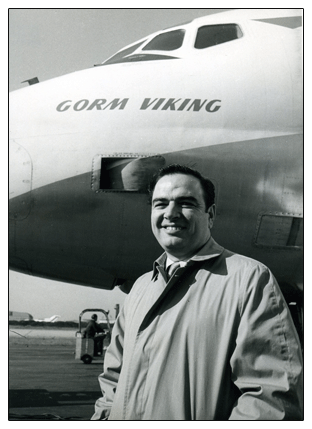 But despite visions of baseball glory (and
fat checks), the Vergilian counsel that the Fates would lay down the right
path to the future held true to Trimboli’s career. Destiny is unshakeable.
Thus, in time, he was to exchange a bat and glove for a highly visible
role in the booming new international air cargo industry. His was a calm,
consistent, well-reasoned industry voice, not always in step with IATA
ideology.
But despite visions of baseball glory (and
fat checks), the Vergilian counsel that the Fates would lay down the right
path to the future held true to Trimboli’s career. Destiny is unshakeable.
Thus, in time, he was to exchange a bat and glove for a highly visible
role in the booming new international air cargo industry. His was a calm,
consistent, well-reasoned industry voice, not always in step with IATA
ideology.
Even now, after years of retirement, he
is inclined to regard the air cargo process as considerably more than
a static job. There is a route to professionalization which combines elements
of experience, knowledge, relationships, and reputation. The path traveled
toward authentic professionalization is not much different in the air
freight forwarder industry, he added, but overseas the process starts
with careful internships. He is solidly in support of this procedure,
especially in the current, more complex business/service environment.
As the industry has grown and matured, so
have the requirements that go into the making of a finished air freight
executive. The carriers and intermediaries have gone substantially beyond
“the age of overtakers,” Trimboli stated. “What is sought
today—in addition to the job, of course—are a good educational
background, fluency in one or two foreign languages, people skills, and
awareness of the relationship of world economy and world air cargo.”
Asked whether he found marked differences
between American and overseas air freight customers in their approach
to air shipping, Trimboli, after a full minute’s thought, said,
“Not really.” There is little question that in nearly every
customer’s mind, the price of the service is paramount. This is
not to say that they downplayed the quality of the service covered by
the rate. The haggling could be sharp and wicked. In the end, an acceptable
balance was achieved.
“It was true then and I daresay it
is true today,” Trimboli observed. “A cut rate at the expense
of the airline’s standard service level is simply not acceptable.”
The term “quality service” is
often equated with “tailored” service, molded to the precise
or unique requirements of the shipper or consignee. Trimboli ran through
a number of examples, centering on stowage in the aircraft’s cargo
hold, handling procedures, warehouse release schedules, communication,
etc. While describing some of the special demands made by shippers, the
veteran air cargo executive ticked off on his fingers such major exporting
corporations as IBM, Honeywell, Union Carbide, and NCA.
When it first happened, the air cargo press
seemed not to notice. Then there were another couple of instances where
confirmed air shippers reverted to surface transportation. Is this merely
a blip to be shrugged off with a tolerant smile? Or is it the start of
a worrisome trend?
Trimboli noted that while the reported cases
of turnbacks have been relatively few, they should not be ignored. Both
the steamship lines and motor freight operators have improved their services
and can make an economic difference for shippers of certain commodities.
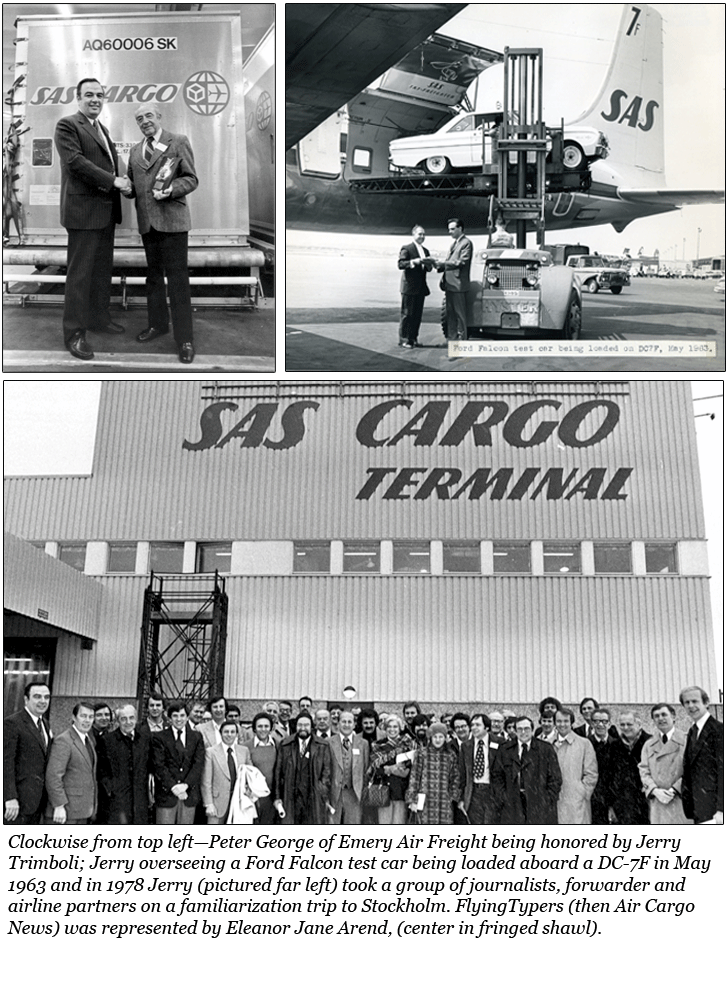 |
Today, at age 81, dividing his
time between homes in New York and North Carolina, Jerome Trimboli never
abandoned his interest in air cargo during his years of retirement. His
awareness of industry events and development are up to date and acute.
In private conversation he may recall an intricate air freight operation,
or quote a memorable statement by a colleague. Could he name one or more
people who he credits for advancing his own knowledge of the business?
He had four names on the tip of his lips: Anker Palvig, SAS’s early
cargo manager at Idlewild Airport; John C. Emery, Jr., president, Emery
Air Freight; Charles L. Gallo, president, Air Express International; and
Bart Shaw, SAS’s vice president–sales, North America.
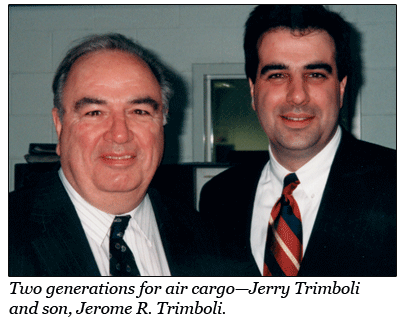 A native of Brooklyn and a graduate of Brooklyn
College, Trimboli is married, with two daughters and a son (who represents
the family’s second generation in the air cargo industry), and eight
grandchildren. Trained as a paratrooper during the Korean War years, he
turned up in Frankfurt where he was assigned to the military police.
A native of Brooklyn and a graduate of Brooklyn
College, Trimboli is married, with two daughters and a son (who represents
the family’s second generation in the air cargo industry), and eight
grandchildren. Trained as a paratrooper during the Korean War years, he
turned up in Frankfurt where he was assigned to the military police.
Just 60 years ago there was the inevitable
collision of Trimboli’s separation from the U.S. Army and the need
to find a job. Air freight was the farthest from his thoughts, but upon
the advice of a friend, he turned his footsteps toward Idlewild Airport
and wound up with employment at Scandinavian Airlines System. The year
was 1955, and he was given the grand title of warehouseman. The following
year he shifted from wrestling with shipments to the more palatable position
of cargo agent. This eventuated as a springboard to cargo sales agent
(1956-58) which directed the young man to covering a unique sales territory—mid-Manhattan,
between the Hudson River and East River.
In 1958 there was a brief interim as a licensed
flight dispatcher before Trimboli’s promotion to New York district
cargo sales manager, quickly followed by appointment as airport cargo
manager. Three years of successful sales production lifted him to head
North American cargo sales. With the passage of another year his title
was revised from “manager” to “director” to reflect
additional responsibilities. In 1982, a large part of the transatlantic
industry was stunned to learn that Jerry Trimboli, the man with the hearty
laugh, had resigned from the Scandinavian carrier. His reason was short
and simple: differences in air cargo service policy.
 In
the time his more than a quarter-century with the airline (during which
his managerial efforts were mirrored in the President’s E for Export
Award), he had been a candid admirer of the air freight forwarder and
its role in the global transportation universe. Thus, it came as no surprise
to learn from trade headlines that Trimboli had assumed the office of
chairman, president, and CEO of Interjet Systems, Inc., a position he
held for 16 years. This phase of his career also included the presidency
of the Air Freight Forwarders Association. In
the time his more than a quarter-century with the airline (during which
his managerial efforts were mirrored in the President’s E for Export
Award), he had been a candid admirer of the air freight forwarder and
its role in the global transportation universe. Thus, it came as no surprise
to learn from trade headlines that Trimboli had assumed the office of
chairman, president, and CEO of Interjet Systems, Inc., a position he
held for 16 years. This phase of his career also included the presidency
of the Air Freight Forwarders Association.
Trimboli was at the height of his career
at SAS when he was credited with promotion and setting export records
for airborne Norwegian salmon. (The apparent superiority of the product
enticed Trimboli to organize a small, privately-owned sales company, purely
a family operation.) His efforts, recognized by the Norwegian government,
won Trimboli that country’s prestigious Export Award.
An intimate look at Jerry Trimboli, a retired
gentleman since 2006, finds him active as a painter with oils, tackling
weeds in his garden, and making up time as an ardent reader of books.
He was a familiar personality at industry
meetings and conventions here and abroad. Expressed in print, his views
on attitudinal pressures, business policy, competition, and ethics have
drawn spirited debate. Though a retiree for nearly a decade, he has kept
fully abreast of industry affairs.
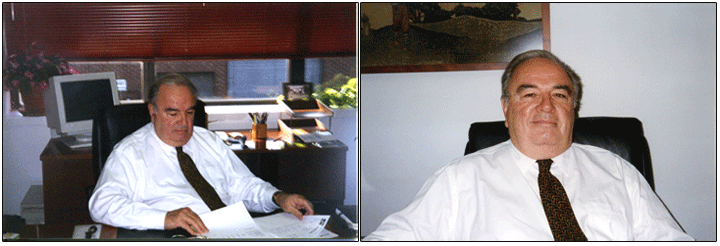 |
Among the multitude
of shipments he oversaw as an airline cargo executive, there was one that
persistently stuck in Trimboli’s memory. As near as he could remember,
the year was 1961, and there was an urgent call from Frederik Henjes Co.,
an IATA cargo agency representing Union Carbide. Could he rush a couple
of thousand kilos of Severin insecticide to Cairo? Even though SAS operated
no freighters then, the answer to Henjes was yes. The shipment of drums,
each weighing 55 pounds, were loaded onto the seats of a DC-8 passenger
plane, each “a perfect fit”. When the crew entered the aircraft
at the airport in New York, the captain asked with a straight face whether
there was any room left in the cockpit.
Was his interest in economics the result
of his studies at Brooklyn College? Surprisingly, Trimboli shook his head.
“No,” he said. “I majored
in economics in college, but it was SAS where my majoring in economics
actually started.”
How so?
“Well, I began to see the correlation
between goods that were shipped, and I saw it as the opportunity to market
goods in a quick and safe way.”
It was about that time—the latter
Fifties—that SAS assigned him as its first cargo sales representative
on this side of the Atlantic, and one of the few calling on commercial
accounts of control data—Hewlett Packard—Esso Standard Pfizer
ilk. For the most part, these air shipments fell in the emergency category.
Nevertheless, he added, “It opened the door to an opportunity to
get them to understand the economics of shipping by air.”
When I interjected that conversion of the
surface shipper was perhaps the toughest task in air freight sales, Trimboli
stated:
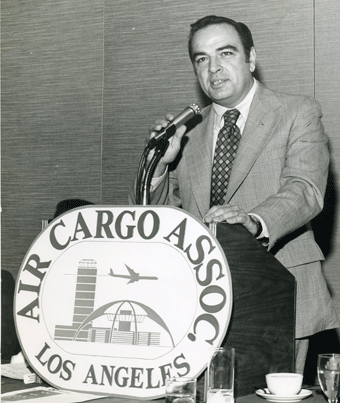 “Understand that I was addressing
traffic oldtimers. They were all cut from the same piece of cloth. Theirs
was more or less one attitude: Don’t rock the boat. I had no course
other than to keep talking about effects on distribution, on-time performance,
the marketplace, and inventory control.”
“Understand that I was addressing
traffic oldtimers. They were all cut from the same piece of cloth. Theirs
was more or less one attitude: Don’t rock the boat. I had no course
other than to keep talking about effects on distribution, on-time performance,
the marketplace, and inventory control.”
When I commented that the industry’s
drive covered years, Trimboli indicated that in Germany “we got
our first break”. McDonald’s admitted that it encountered
problems in receiving fresh lettuce from traditional suppliers. The hamburger
monarch needed quality performance, safety, and price.
The airline was successful in selling a
procedure to shed the lettuce and fly it out of Los Angeles on the transpolar
route.
“This was a whole new market for us,”
Trimboli commented. Shifting to another agricultural product that occurred
to him, he went on to say, “I recall developments and, especially
airline-forwarder issues.” In the latter respect, he was buoyed
by ongoing promotional action enveloping forwarder and agent business
interests during his early SAS years. He decided this required further
explanation:
“You have to bear in mind that I am
speaking about the state of airline-forwarder relations of a generation
ago. We didn’t consider the forwarder to be just another industry
body; we recognized his potential value, and we set out to exploit it.
How did we go about doing it? We ran seminars, we cooperated with educators,
particularly with associate professors at Columbia University, in taking
a realistic view of the how and why of possible bumps in the airline-forwarders
relationship. Then we broke out with AFTD.”
“AFTD?”
“Yes, AFTD—the Air Freight Decision
Tool. It’s only in distant memory today. But it did a great job
in slowly convincing the shipper not to look skeptically at the air freight
rate but at the bottom line which provides the true economic result.”
Asked how he, as a manager with specific
duties, fit into this picture, he asserted that he inevitably found himself
delivering marketing messages at minor and major hubs of education—college,
business school, trade associations, industrial clubs. Unquestionably,
AFTD was front and center Trimboli’s “education tours”.
It may not be readily apparent, but air
travel is at the heart of an air cargo executive. That heart beat strongly
during the length of Trimboli’s airline career. Put to the question
of how many air miles he logged in the course of performing his duties
in accordance with his 27-year SAS career, he was momentarily stumped.
Then, after a period of mental gymnastics, he conceded the inability to
come up with a figure.
“But I can tell you this,” he
added. “Every two weeks I was on the go from New York to Canada,
Los Angeles, Seattle, Chicago, Boston, and cities in Florida and Texas.
International flights? My passbook tells me that I made 400 transatlantic
crossings to Scandinavian countries.”
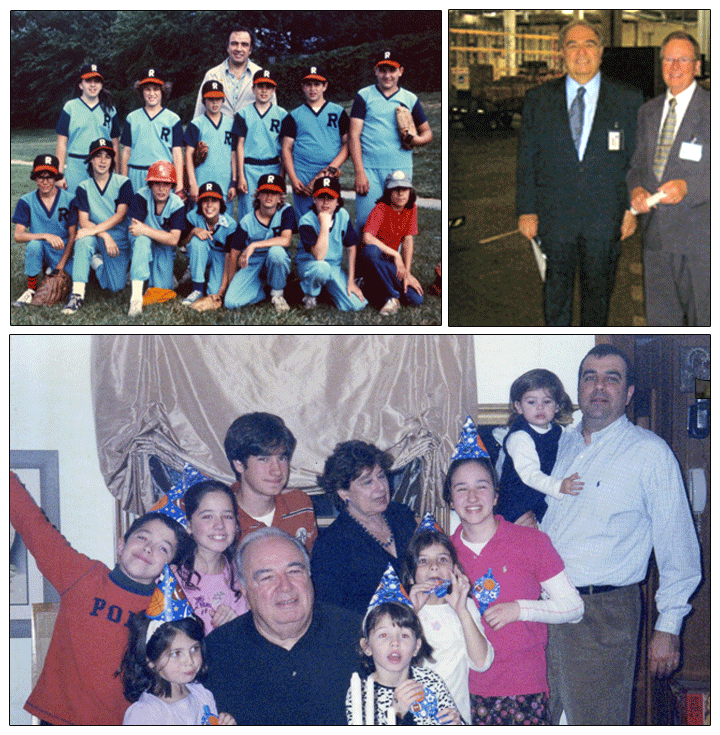 |
All told, Jerry Trimboli has
spent two years short of a half-century in direct and indirect air cargo
transportation. The road to ultimate retirement has been a long one—sometimes
joyful, sometimes a grief. Twice during
his years of service, SAS found it necessary to withdraw the freighter
from the U.S.–Scandinavia run, and Trimboli swallowed hard. Otherwise,
in leisurely, informal chats, he might disclose his pride in having successfully
headed the JFK Cargo Terminal building in 1972. Then there was that victory
when he employed AFTD to convert McDonnell Douglas to systemwide freight
traffic for his company; and developed IBM’s new distribution center
at Kastrup Airport. There were additional operational and marketing victories,
but space requirements consign them to the silent record.
Jerry Trimboli heaved a long sigh. The road
to achievement and contentment had been a long one, but he felt the warm
grip of good fortune in having exchanged a ballfield for an airfield.
Richard Malkin
 |
malkin101@aircargonews.com |





